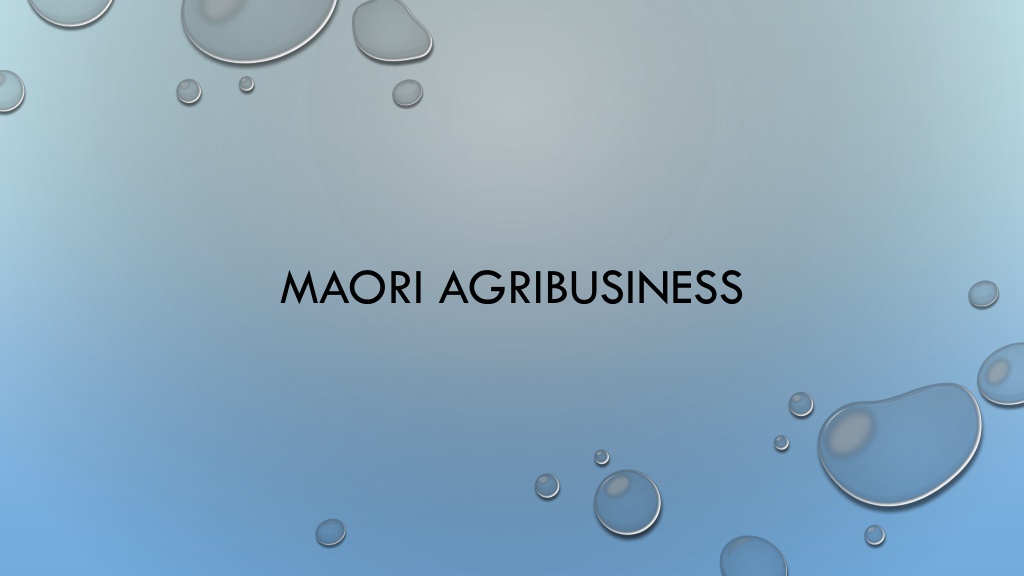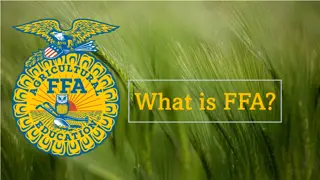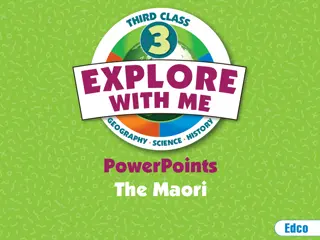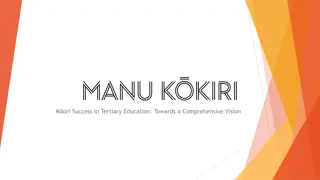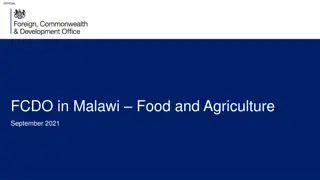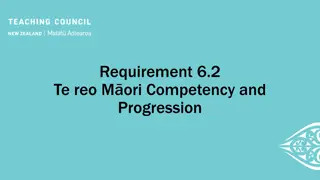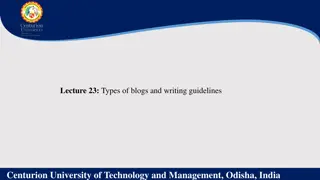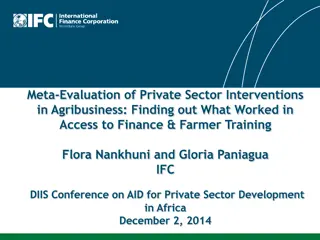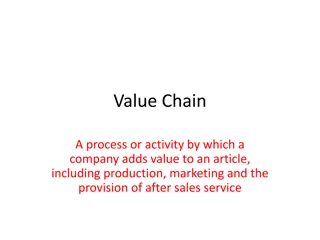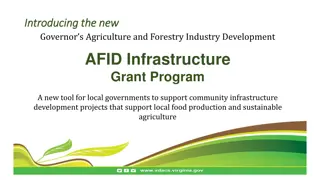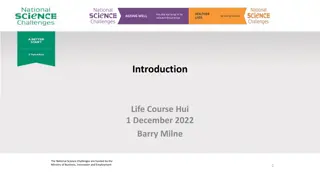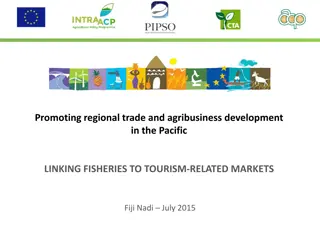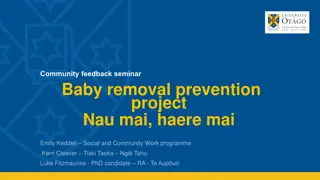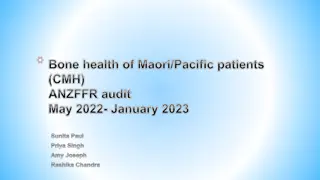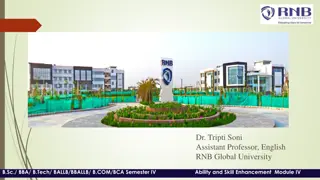Insights into Maori Agribusiness and Land Ownership
Maori agribusiness plays a significant role in New Zealand's economy, with forestry, fishing, lamb, and dairying being key contributors. The Maori worldview and value system, rooted in Tikanga and Kaupapa, influences their behavior and interactions with the land. Maori land ownership is based on the concept of guardianship rather than individual ownership, with a focus on collective responsibility and long-term land management.
Download Presentation

Please find below an Image/Link to download the presentation.
The content on the website is provided AS IS for your information and personal use only. It may not be sold, licensed, or shared on other websites without obtaining consent from the author.If you encounter any issues during the download, it is possible that the publisher has removed the file from their server.
You are allowed to download the files provided on this website for personal or commercial use, subject to the condition that they are used lawfully. All files are the property of their respective owners.
The content on the website is provided AS IS for your information and personal use only. It may not be sold, licensed, or shared on other websites without obtaining consent from the author.
E N D
Presentation Transcript
MAORI ECONOMY Worth $40 billion to New Zealand s economy. Made up of exclusively agricultural assets. Largest contributors are forestry (40%), fishing (38%), lamb (10%) and dairying (10%).
MAORI WORLDVIEW and VALUE SYSTEM Tikanga and kaupapa underpin Maori worldview, value system and drive behaviour. Tikanga = Maori ethics and customary values and practices, e.g. whakapapa (honouring your geneology. Tangata whenua = people of the land. Describes the spiritual link that Maori have with the land that their ancestors came from. Linked to a person's identity. Kaitiakitanga = guardianship. Maori see themselves as protectors of the land for future generations. Kaupapa = principles and policies e.g. taking shoes off in a meeting house. Whanaungatanga = family connections and relationships Manaakitanga = reciprocal gifts of giving
MAORI LAND OWNERSHIP Maori are tangata whenua of the land. View land as taonga tuku iho or sacred treasure. Maori have a long term view of land management and do not see it as an asset for ownership. Rather a responsibility to protect kaitiaki. Incompatible with the concept of ownership. Land belongs to all the whakapapa or collective ownership.
MAORI LAND OWNERSHIP 1.4 million hectares is Maori freehold land. Legal ownership of the land is fragmented. Most amalgamated into Maori Land Trusts or Incorporations. These businesses have thousands of owners, with little business experience. Collective ownership and decision making is difficult.
WHAT IS MORI LAND? M ori land is defined by Te Ture Whenua M ori Act 1993 as being one of two things: 1. M ori customary land: Has not had its ownership investigated and determined by the M ori land court Has not been acquired by the crown Does not have a land transfer act title or deed Continues to be held in accordance with tikanga M ori (M ori customary values and practices). Before the arrival of colonial settlers, all land in New Zealand was held as customary land. One of the primary tasks of the early native land court was to define the boundaries of that land and convert it from communally held land by allocating owners and shares. Only a small number of customary land blocks remain in New Zealand and they total less than 700 hectares.
2. M ori freehold land: Has been investigated by the M ori land court and a freehold order has been issued or Was set aside by the crown as M ori freehold land and awarded by crown grants to specific individuals or Has had the status determined as M ori freehold land by order of the M ori land court. M ori freehold land is held by individuals who have shares together as tenants in common. In a modern context it has two main characteristics which make it a unique land tenure: Economic value An interest in M ori land is, like general land, an economic asset that may be used, traded, sold or transferred. However, unlike general land, our act sets strong rules around ensuring that land stays in the hands of its owners, wh nau and the hap associated with it. Cultural value Our act recognises that M ori land is a taonga tuku iho of special significance to M ori passed from generation to generation. An interest in M ori land is also considered a tangible whakapapa (genealogical) link for owners to their past and present wh nau, hap and iwi, whether they live on or close to the land or not.
MORI LAND TRUSTS & INCORPORATIONS Able to create a range of structures to hold M ori land shares or manage M ori land blocks. 1. Share based trusts hold shares in multiple owned or solely owned M ori land blocks and include: Wh nau Trust - a family orientated trust Kaitiaki Trust - A kaitiaki trust can be established to hold shares in M ori land, M ori Incorporations, general land or any personal property for a person who: is a minor (under the age of 20) is serving a period of imprisonment by reason of their age or mental or physical disablement is unable to manage their own affairs. Putea Trust - a special type of trust that allows different owners of small and uneconomic shares to pool their land interests together for the benefit of their wider wh nau and descendants.
2. Land based trusts manage M ori land blocks on behalf of land owners and include: Ahu Whenua Trust - An Ahu Whenua trust is a common land trust. It is designed to promote the use and administration of one or more M ori land blocks or general land owned by M ori on behalf of its owners. Whenua T p Trust - A Whenua T p trust is a special type of land trust which is established over land that is to be held for community purposes or for a hap or iwi. This type of trust is designed to receive former public works land or other community properties and to promote its use and administration for the benefit of the descendants of the original owners, for the hap or iwi in the area or for any M ori community purposes. M ori Reservation - is a very specific type of trust which sets aside (reserves) M ori land or general land for a very specific community purpose, which can include any one or a combination of the following: Marae, Urup , W hi tapu, Papak inga, Kaum tua Housing, Spring, well or other water reserve, Catchment area or other source of a water supply, Place of cultural, historical or scenic interest, Meeting place, Landing place, Fishing ground, Recreational ground, Conservation reserve, Timber reserve.
A land based ownership structure is a company established over Mori land with shareholders: M ori Incorporation - similar to a company and can be established over any M ori land. has all the powers of a limited liability company becomes the legal owner of any lands or assets vested in it has a Committee of Management who are elected by a meeting of shareholders has shareholders, who own shares in the Incorporation, rather than in any individual block maintains its own list of shareholders (we do not have ownership information for an Incorporation) may stipulate a minimum shareholding for shares can declare dividends and manage its own unclaimed dividends is governed by the M ori Incorporations Constitution Regulations 1994. 3.
The benefits of Incorporation include: ability to establish and run commercial operations for maximum financial benefit to the shareholders the application of a corporate model to the management of M ori land autonomy from the normal M ori Land Court practices that apply to normal trusts voting and resolutions affecting an incorporation are done on the basis of the number of shares you have, rather than the number of votes received.
MAORI LAND BASED BUSINESSES Operate under the earlier stated values and these influence how businesses operate. Decision making takes into account social, economic, environmental, and cultural implications. Rate of development is long term and generally conservative. Protecting the land is of up most importance, so anything that puts the land at risk are not done. Therefore borrowing capital on land is not done. Joint ventures are common to spread risk of development and raise the capital required.
POTENTIAL 1 million hectares underperforming. If $3 billion was invested in infrastructure in Maori land businesses, $8 billion would be returned over 10 years, creating 3,600 new on-farm jobs, and large expansion in the service industries. Examples; Tuaropaki worth $667million. They have established a geothermal power plant that powers greenhouses where premium export grade flowers are produced. They have also developed a worm farm and native plant nursery to use waste from the greenhouses. The worm farm also uses waste from the Miraka dairy processing factory which is a joint venture between Tuaropaki and other Maori organisations.
OWNERSHIP STRUCTURE SUMMARY Range of ownership structures, from trusts to incorporations such as an ahu whenua trust, a wh nau trust, a whenua t p trust, a p tea trust, a kaitiaki trust, or an incorporation Key governance skills and capabilities are required. Succession, life interest & wh ngai Succession is the transfer of shares from a deceased owner to their descendants and beneficiaries.
